新概念英语第二册第19课教程文件
- 格式:doc
- 大小:87.00 KB
- 文档页数:21
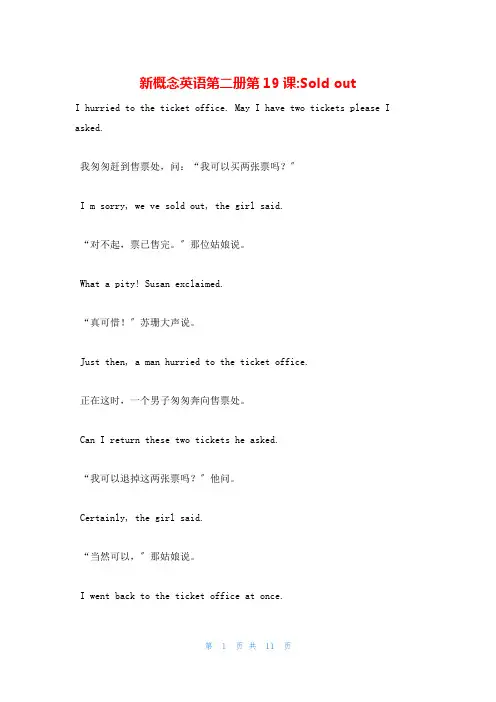
新概念英语第二册第19课:Sold outI hurried to the ticket office. May I have two tickets please I asked.我匆匆赶到售票处,问:“我可以买两张票吗?〞I m sorry, we ve sold out, the girl said.“对不起,票已售完。
〞那位姑娘说。
What a pity! Susan exclaimed.“真可惜!〞苏珊大声说。
Just then, a man hurried to the ticket office.正在这时,一个男子匆匆奔向售票处。
Can I return these two tickets he asked.“我可以退掉这两张票吗?〞他问。
Certainly, the girl said.“当然可以,〞那姑娘说。
I went back to the ticket office at once.我马上又回到售票处。
Could I have those two tickets please I asked.“我可以买那两张票吗?〞我问。
Certainly, the girl said, but they re for next Wednesday s performance. Do you still want them“当然可以,不过这两张票是下星期三的,您是否还要呢?〞I might as well have them, I said sadly.“我还是买下的好,〞我垂头丧气地说。
New words and Expressions生词和短语hurryv. 匆忙ticket office售票处pityn. 令人遗憾的事exclaimv. 大声说returnv. 退回sadlyadv. 悲哀地,丧气地Notes on the text课文注释1 The play may begin at any moment,剧马上就要开演了。
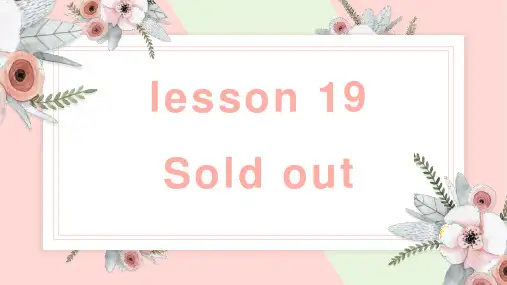
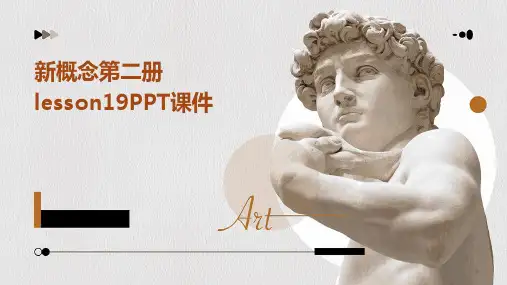
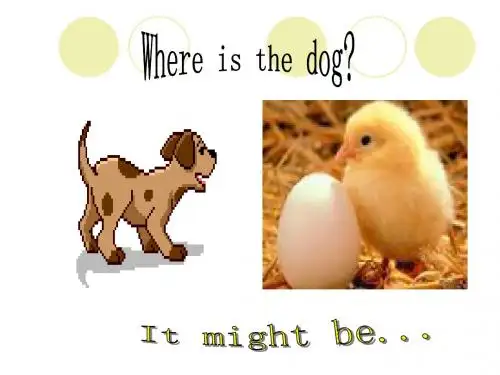
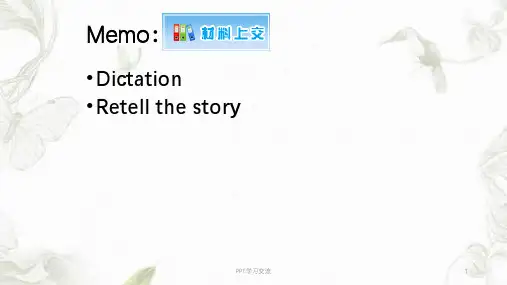
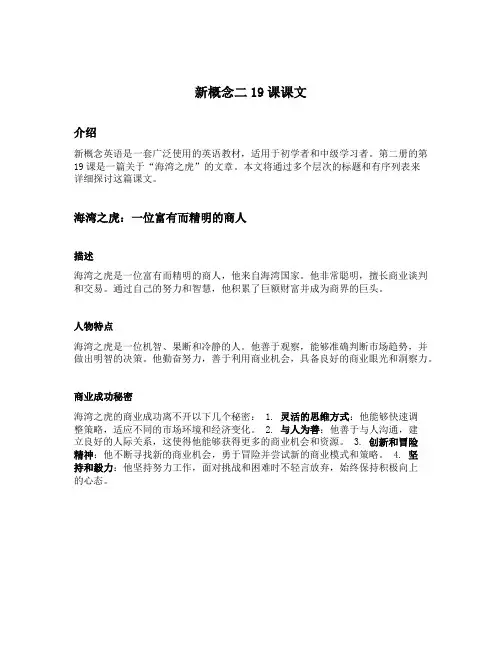
新概念二19课课文介绍新概念英语是一套广泛使用的英语教材,适用于初学者和中级学习者。
第二册的第19课是一篇关于“海湾之虎”的文章。
本文将通过多个层次的标题和有序列表来详细探讨这篇课文。
海湾之虎:一位富有而精明的商人描述海湾之虎是一位富有而精明的商人,他来自海湾国家。
他非常聪明,擅长商业谈判和交易。
通过自己的努力和智慧,他积累了巨额财富并成为商界的巨头。
人物特点海湾之虎是一位机智、果断和冷静的人。
他善于观察,能够准确判断市场趋势,并做出明智的决策。
他勤奋努力,善于利用商业机会,具备良好的商业眼光和洞察力。
商业成功秘密海湾之虎的商业成功离不开以下几个秘密: 1. 灵活的思维方式:他能够快速调整策略,适应不同的市场环境和经济变化。
2. 与人为善:他善于与人沟通,建立良好的人际关系,这使得他能够获得更多的商业机会和资源。
3. 创新和冒险精神:他不断寻找新的商业机会,勇于冒险并尝试新的商业模式和策略。
4. 坚持和毅力:他坚持努力工作,面对挑战和困难时不轻言放弃,始终保持积极向上的心态。
商业谈判技巧准备工作商业谈判的成功与否与准备工作密切相关。
以下是一些准备工作的要点: 1. 了解对方:在谈判前,要对对方进行充分的调查和了解,包括对方的背景、目标和利益等,以便制定更好的谈判策略。
2. 设定目标:在谈判前,要明确自己的目标,并设定合理和可行的目标,以便在谈判中有所侧重。
3. 制定策略:根据对方和自身的情况,制定出适用的谈判策略,包括主动和被动的策略。
谈判技巧成功的商业谈判离不开一些关键的技巧。
以下是一些常用的谈判技巧: 1. 倾听和观察:在谈判过程中,要善于倾听和观察,了解对方的需求、意愿和底线,并根据对方的言行举止作出相应的反应。
2. 掌握主动权:在谈判中,要尽量掌握主动权,主动发起谈判内容和节奏,以达到自己的目标。
3. 善于妥协:在商业谈判中,双方往往需要妥协,要善于在保护自身利益的前提下,与对方寻找共同的利益点。

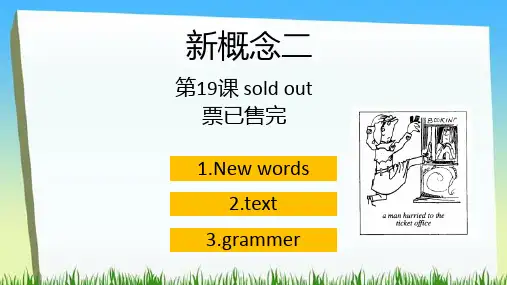
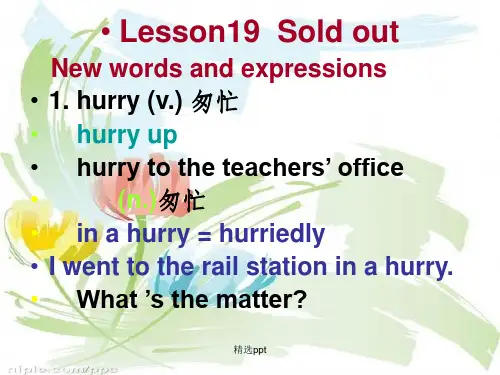
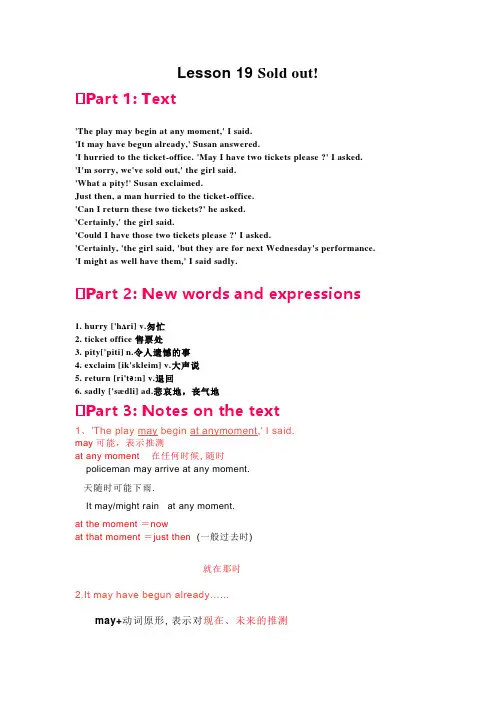
Lesson 19 Sold out!Part 1: Text'The play may begin at any moment,' I said.'It may have begun already,' Susan answered.'I hurried to the ticket-office. 'May I have two tickets please ?' I asked. 'I'm sorry, we've sold out,' the girl said.'What a pity!' Susan exclaimed.Just then, a man hurried to the ticket-office.'Can I return these two tickets?' he asked.'Certainly,' the girl said.'Could I have those two tickets please ?' I asked.'Certainly, 'the girl said, 'but they are for next Wednesday's performance. 'I might as well have them,' I said sadly.Part 2: New words and expressions1. hurry ['hʌri] v.匆忙2. ticket office 售票处3. pity['piti] n.令人遗憾的事4. exclaim [ik'skleim] v.大声说5. return [ri'tə:n] v.退回6. sadly ['sædli] ad.悲哀地,丧气地Part 3: Notes on the text1、'The play may begin at anymoment,' I said.may 可能,表示推测at any moment 在任何时候, 随时policeman may arrive at any moment.天随时可能下雨.It may/might rain at any moment.at the moment =nowat that moment =just then (一般过去时)就在那时2.It may have begun already…...may+动词原形, 表示对现在、未来的推测She may be a model.may+ have done,表示对过去的推测She may have been a model.I may have watched TV last night.3、I hurried to the ticket office. 'May I have two tickets please?' I asked.★ hurried to+sp 匆匆忙忙地去某地★May 表示-请求,询问,说明一件事May I have your name? (比“What’s your name?”更有礼貌些)Can I have your name?Can和may表示-请求,询问的区别:Can 可以用在第一,二人称.may 只能用第一人称.4、'I'm sorry, we've sold out,' the girl said.sell out (店主)售完(某种货物),(货)被售完They have sold out of eggs.Tickets for tonight’s performance are sold out5.'What a pity!’ Susan exclaimed.感叹句 What a pity (it is)!exclaim 大声说,比shout正式。
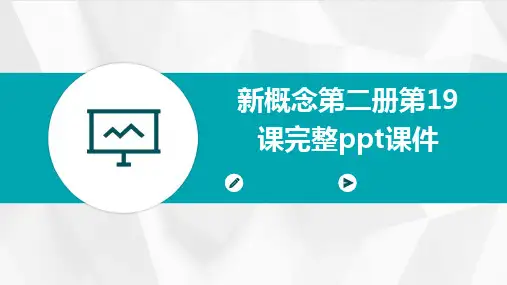
Lesson 19 Sold out 票已售完'The play may begin at any moment,' I said.'It may have begun already,' Susan answered.I hurried to the ticket office. 'May I have two tickets please?' I asked.'I'm sorry, we've sold out,' the girl said.'What a pity!' Susan exclaimed.Just then, a man hurried to the ticket office.'Can I return these two tickets?' he asked.'Certainly,' the girl said.I went back to the ticket office at once.'Could I have those two tickets please?' I asked.'Certainly,' the girl said, 'but they're for next Wednesday's performance. Do you still want them?''I might as well have them,' I said sadly.New words and expressions 生词和短语hurry v. 匆忙ticket office 售票处pity n. 令人遗憾的事exclaim v. 大声说return v. 退回sadly adv. 悲哀地,丧气地参考译文“剧马上就要开演了,”我说。
新概念第二册第19课课件一、教学目标1.知识与技能:学生能够理解并运用本课所学的词汇和句型,描述家庭成员及其职业。
2.过程与方法:通过听、说、读、写等多种方式,提高学生的英语交际能力。
3.情感态度与价值观:培养学生热爱家庭、尊敬长辈的情感,增强对英语学习的兴趣。
二、教学内容1.词汇:father,mother,brother,sister,doctor,teacher,driver,worker2.句型:Whatdoesyourfatherdo?Heisadoctor.Whataboutyourmother?Sheisa teacher.三、教学重点与难点1.教学重点:掌握词汇和句型,能够描述家庭成员及其职业。
2.教学难点:正确使用句型进行交际,注意家庭成员称谓的用法。
四、教学过程1.热身活动(5分钟)老师与学生用英语进行自我介绍,互相询问家庭成员。
学生两人一组,用英语描述自己的家庭成员。
2.词汇学习(10分钟)老师展示图片,引导学生学习新词汇。
学生跟读并模仿发音,注意家庭成员称谓的用法。
3.句型学习(10分钟)老师示范句型的用法,引导学生进行模仿。
学生两人一组,用句型进行问答练习。
4.听力练习(10分钟)老师播放录音,学生听并回答问题。
学生两人一组,进行听力练习。
5.口语练习(10分钟)老师组织学生进行角色扮演,模拟家庭成员的交际场景。
学生两人一组,进行口语练习。
6.作业布置(5分钟)学生回家后,用英语向家人介绍家庭成员及其职业。
完成课后练习题。
五、教学评价1.课堂表现:观察学生在课堂上的参与程度、积极性和合作精神。
2.作业完成情况:检查学生作业的准确性和完整性。
3.口语表达能力:评估学生在口语练习中的表达能力和交际能力。
六、教学反思1.教师应注重培养学生的听、说、读、写综合能力,提高学生的英语交际能力。
2.教师应关注学生的学习需求,因材施教,激发学生的学习兴趣。
3.教师应加强对学生的个别辅导,帮助学生克服学习难点。
Lesson 19 Sold out 票已售完'The play may begin at any moment,' I said.'It may have begun already,' Susan answered.I hurried to the ticket office. 'May I have two tickets please?' I asked.'I'm sorry, we've sold out,' the girl said.'What a pity!' Susan exclaimed.Just then, a man hurried to the ticket office.'Can I return these two tickets?' he asked.'Certainly,' the girl said.I went back to the ticket office at once.'Could I have those two tickets please?' I asked.'Certainly,' the girl said, 'but they're for next Wednesday's performance. Do you still want them?''I might as well have them,' I said sadly.New words and expressions 生词和短语hurry v. 匆忙ticket office 售票处pity n. 令人遗憾的事exclaim v. 大声说return v. 退回sadly adv. 悲哀地,丧气地参考译文“剧马上就要开演了,”我说。
新概念英语第二册第19课Lesson 19 Sold out 票已售完'The play may begin at any moment,' I said.'It may have begun already,' Susan answered.I hurried to the ticket office. 'May I have two tickets please?' I asked.'I'm sorry, we've sold out,' the girl said.'What a pity!' Susan exclaimed.Just then, a man hurried to the ticket office.'Can I return these two tickets?' he asked.'Certainly,' the girl said.I went back to the ticket office at once.'Could I have those two tickets please?' I asked.'Certainly,' the girl said, 'but they're for next Wednesday's performance. Do you still want them?''I might as well have them,' I said sadly.New words and expressions 生词和短语hurry v. 匆忙 ticket office 售票处 pity n. 令人遗憾的事exclaim v. 大声说return v. 退回 sadly adv. 悲哀地,丧气地参考译文“剧马上就要开演了,”我说。
“也许已经开演了呢,”苏珊回答说。
我匆匆赶到售票处,问:“我可以买两张票吗?”“对不起,票已售完。
”那位姑娘说。
“真可惜!”苏珊大声说。
正在这时,一个男子匆匆奔向售票处。
“我可以退掉这两张票吗?”他问。
“当然可以,”那姑娘说。
我马上又回到售票处。
“我可以买那两张票吗?”我问。
“当然可以,不过这两张票是下星期三的,您是否还要呢?”“我还是买下的好,”我垂头丧气地说。
1.Sold out 票已售完sell [sel]v., n.v. (sold, sold[səʊld]) (opposite: buy bought , bought)1.~sth. (to sb.) (at/for sth.) / ~sb. sth. (at/for sth.) to give sth. to sb. in exchange for money出让;转让:e.g. [vn, vnn] 我把我的汽车转让给了詹姆斯,获得800英镑。
I sold my car to James for 800 pounds. I sold James my car for 800 pounds.[vn] 他们把公司卖掉,赢了利/赔了钱。
They sold the business at a profit/loss (=they gained/lost money when they sold it).[v] 我们开了好价钱,但他们不卖。
We offered them a good price but they wouldn’t sell.2. [vn] to offer sth. for people to buy出售;售卖:e.g. 你这儿卖邮票吗?Do you sell stamps? 出售保险 to sell insurance [inˈʃuərəns]3. to be bought by people in the way or in the numbers mentioned; to be offered at the price mentioned销售得…;卖出…;售价是…:e.g. [vn]这种杂志一周售出30万册。
The magazine sells 300,000 copies a week.sell well畅销 sell badly 滞销这部戏的票卖得很好/不好。
The tickets for the play sold well/badly.The new design just didn’t sell (=nobody bought it).新款式无人问津。
sell for +价格以…价格出售 sell at +价格以…价格卖出e.g. 这个花瓶至少要卖5000美元。
The vase will sell for 5000 dollars at least.今年,洋白菜的价格很高。
Cabbage is selling at a high price this year.4. [vn] ~sth./yourself (to sb.) to persuade sb. that sth. is a good idea, service, product, etc.; to persuade sb. that you are the right person for a job, position, etc.推荐;推销;自荐;自我推销:e.g. 应聘面试的时候,你真得推销你自己。
You really have to sell yourself at a job interview.Phr.v.1. sell sth. off1) to sell things cheaply because you want to get rid of them or because you need the money甩卖;抛售;变卖(get rid of sb./sth. 摆脱;丢弃;扔掉)2) to sell all or part of an industry, a company or land出售,卖掉(产业、公司或土地):e.g. 教堂卖掉了那块地皮,用来盖房子了。
The Church sold off the land forhousing.(house [hauz]vt.1. 给(某人)提供住处 2.收藏;安置 housing n. 1. [u](统称)住房,住宅 2. [u] 住房供给)2. sell out / be sold out (of tickets for a concert, football game, etc.音乐会、足球赛等的门票) to be all sold售完:e.g.几小时内票就卖光了。
The tickets sold out within hours.所有的票被卖光了。
All the tickets have been sold out.3. sell out (of sth.) / be sold out (of sth.) to have sold all the available items, tickets, etc.售空,卖光(某种商品、门票等);脱销:e.g. 抱歉,我们的面包卖完了。
I’m sorry, we’ve sold out of bread.我们卖光了所有的票。
We’ve sold out of all the tickets.先生,星期天的报纸已经卖完了。
We are sold out of Sunday newspapers, sir. seller[ˈselə]n.1. a person who sells sth. 卖者;销售者;卖方:opposite: buyer[ˈbaɪə]e.g. 卖花人 a flower seller这项法律意在保护买卖双方。
The law is intended to protect both the buyer and the seller.2.a good, poor, etc.~ a product that has been sold in the amounts or way mentioned(畅销、滞销等的)商品:e.g. 畅销的商品 a good seller 滞销的商品 a bad/poor seller 畅销品 a best sellerIDM: a seller’s market 卖方市场selling point n. a feature of sth. that makes people want to buy or use it卖点(吸引顾客的产品特色):e.g. 显然,价格低是一大卖点。
The price is obviously one of the main selling points.selling price n. 销售价sale[seil]n.1. [u, c] an act or the process of selling sth.出售;销售:e.g. 汽车/服装/商品的销售 the sale of cars/clothes/goods2. (sales) [pl.] the number of items sold销售量3. (sales) [u] (also sales department [c]) the part of a company that deals with selling its products销售部4. [c] an occasion when a shop/store sells its goods at a lower price than usual特价销售;廉价出售;大减价:5. [c] an occasion when goods are sold, esp. an auction([ˈɔ:kʃən]n. 拍卖;竞卖;标售)销售活动;(尤指)拍卖IDM:1. for sale available to be bought, esp. from the owner待售;供出售(尤指从主人手里)e.g. 待售的房子 a house for sale 抱歉,这个不卖。
I’m sorry, it’s not for sale.2. on sale1) available to be bought, esp. in a shop/store(常用于商店)出售,上市:e.g. 售票处正在售票。
Tickets are on sale from the booking office.新款下月上市。